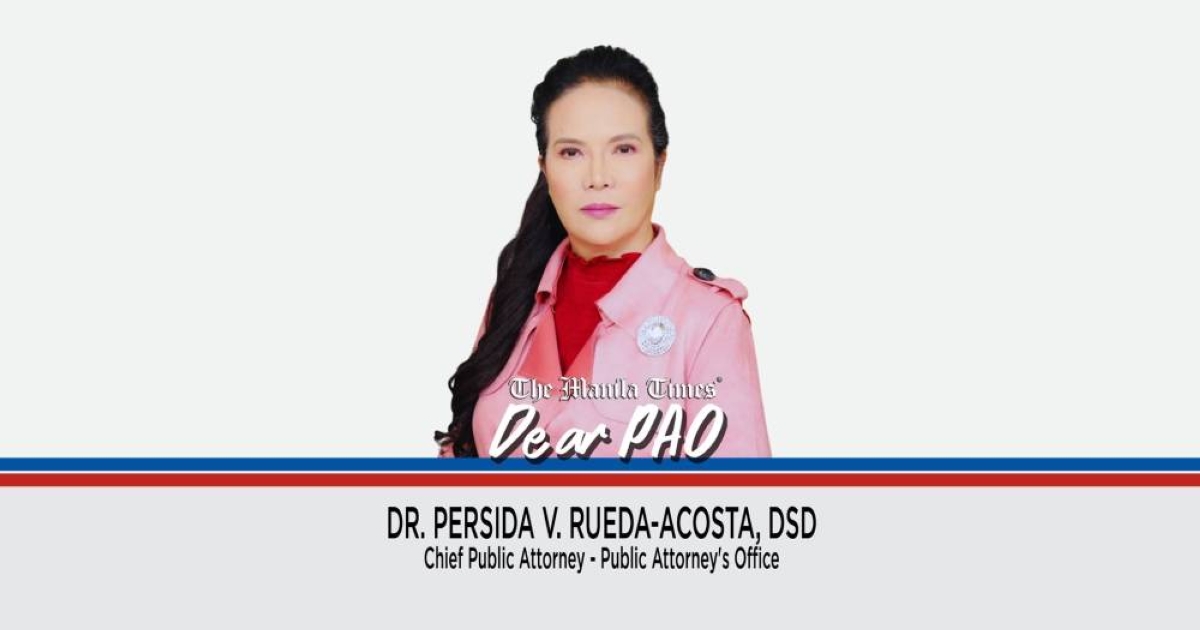Dear PAO,
I have a friend who was previously married in 1995, and they had three (3) children. In 2015, my friend’s spouse passed away. Subsequently, my friend remarried and had two (2) more children. Unfortunately, my friend passed away last year, on Dec. 23, 2024, to be exact. The three children from her first marriage then executed an extrajudicial settlement over her properties. Is the extrajudicial settlement valid? Thank you for your response!
Pen
Dear Pen,
The heirs may extrajudicially settle the estate by agreement, subject to the requirements under Rule 74 of the Revised Rules of Court. Under Section 1, Rule 74 of the Revised Rules of Court, if the decedent left no will and the heirs are all of legal age, or the minors are represented by their judicial or legal representatives duly authorized for the purpose, the heirs may divide the estate among themselves by executing what is commonly referred to as deed of extrajudicial settlement of estate:
“SECTION 1. Extrajudicial settlement by agreement between heirs.— If the decedent left no will and no debts and the heirs are all of age, or the minors are represented by their judicial or legal representatives duly authorized for the purpose, the parties may, without securing letters of administration, divide the estate among themselves as they see fit by means of a public instrument filed in the office of the register of deeds, and should they disagree, they may do so in an ordinary action of partition. If there is only one heir, he may adjudicate to himself the entire estate by means of an affidavit filed in the office of the register of deeds. The parties to an extrajudicial settlement, whether by public instrument or by stipulation in a pending action for partition, or the sole heir who adjudicates the entire estate to himself by means of an affidavit shall file, simultaneously with and as a condition precedent to the filing of the public instrument, or stipulation in the action for partition, or of the affidavit in the office of the register of deeds, a bond with the said register of deeds, in an amount equivalent to the value of the personal property involved as certified to under oath by the parties concerned and conditioned upon the payment of any just claim that may be filed under Section 4 of this rule. It shall be presumed that the decedent left no debts if no creditor files a petition for letters of administration within two years after the death of the decedent.
The fact of the extrajudicial settlement or administration shall be published in a newspaper of general circulation in the manner provided in the next succeeding section; but no extrajudicial settlement shall be binding upon any person who has not participated therein or had no notice thereof.”
Get the latest news
delivered to your inbox
Sign up for The Manila Times newsletters
By signing up with an email address, I acknowledge that I have read and agree to the Terms of Service and Privacy Policy.
Under Article 778 of the New Civil Code of the Philippines (NCC), succession may be testamentary (if the decedent died with a will), intestate (if the decedent died without a will) or mixed. In the absence of a will, legal or intestate succession takes place.
Article Nos. 979 and 980 of the NCC emphasized that in intestate succession, the legitimate children and their descendants have equal rights even if they should come from different marriages. Article Nos. 979 and 980 of the said Code provide:
“Article 979. Legitimate children and their descendants succeed the parents and other ascendants, without distinction as to sex or age, and even if they should come from different marriages. xxx
Article 980. The children of the deceased shall always inherit from him in their own right, dividing the inheritance [into] equal shares.”
Relatedly, if some of the intestate heirs will be omitted in the execution of the extrajudicial settlement, it will not be valid and binding upon them. The Supreme Court held in the case of Neri vs. Heirs of Uy (GR 168081, GR 194366, Oct. 10, 2012, penned by Associate Justice Estela Perlas-Bernabe) that:
“Hence, in the execution of the Extra-Judicial Settlement of the Estate with Absolute Deed of Sale in favor of spouses Uy, all the heirs of Anunciacion should have participated. Considering that Eutropia and Victoria were admittedly excluded and that then minors Rosa and Douglas were not properly represented therein, the settlement was not valid and binding upon them and consequently, a total nullity.”
With regard to your question, the extrajudicial settlement executed only by the three children from the first marriage may not be valid if there are other intestate heirs who were excluded. In the situation of your friend who appears to have died without a will, her estate will be distributed through intestate succession.
If only some of the intestate heirs executed the deed of extrajudicial settlement of estate, then it is considered to be a total nullity because the three children from the first marriage of your friend excluded their half siblings from the second marriage of their deceased mother. All intestate heirs must be parties to the settlement; otherwise, the omitted heirs may file for a petition for annulment of the extrajudicial settlement.
We hope that we are able to answer your queries. This advice is based solely on the facts you have narrated and our appreciation of the same. Our opinion may vary when other facts are changed or elaborated.
We appreciate your trust and support.
Editor’s note: Dear PAO is a daily column of the Public Attorney’s Office. Questions for Chief Acosta may be sent to [email protected].
